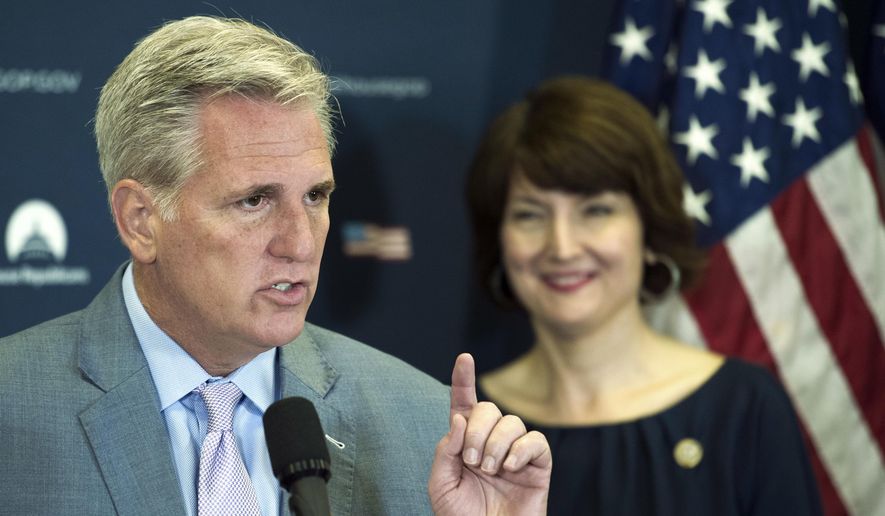House Republicans say they will vote Thursday on a long-awaited plan to repeal and replace Obamacare, after a pivotal 24 hours in which the White House and congressional Republican leaders agreed to changes that won over two prominent holdouts and paved the way for action before lawmakers take a weeklong vacation.
The vote is a critical moment for Republicans, who have pushed for seven years to reverse the 2010 health care overhaul and beat an embarrassing retreat from their first attempt this year.
Enthusiasm for the plan appeared to wane on Tuesday, yet President Trump and House leaders then embraced a plan by Rep. Fred Upton, Michigan Republican, that provides $8 billion over five years to reduce premiums and out-of-pocket costs for people who have been seriously sick and then experience a gap in coverage — a sequence that would force them to pay more in states that waive certain protections embedded in Obamacare.
House Majority Whip Steve Scalise, Louisiana Republican, alerted members that the first votes would be taken in the morning. Majority Leader Kevin McCarthy, California Republican, told reporters that the roll call on final passage was set for the afternoon.
Mr. Upton, a respected Republican voice on health care policy, and Rep. Billy Long, a conservative Republican from Missouri, said the changes flipped them into the “yes” column after their defections this week threatened to doom the effort, foreshadowing a turn in fortunes for Republican leaders.
“My sense is that there are a number of folks that will come on board now that we have this,” Mr. Upton said.
Members of the conservative House Freedom Caucus, for instance, said they would not revoke their support for the revised bill, which also lets states opt out of a series of “essential” health care benefits, such as maternity and mental health care and prescription drug coverage.
Democrats said House Republicans will come to regret the vote.
“Tomorrow, the American people will have the opportunity to see where their individual representatives stand when it comes to protecting access to affordable health care,” said House Minority Whip Steny H. Hoyer, Maryland Democrat.
He said the Congressional Budget Office estimated that 24 million fewer Americans would hold insurance under the plan a decade from now.
“No number of amendments can fix this terrible bill — it is irredeemable,” he said.
Even before his Wednesday evening announcement, Mr. McCarthy had warned lawmakers not to leave before Thursday because Republican vote counters sensed they were closing in on success.
SEE ALSO: Key GOP holdouts flip to ‘yes’ on health care
Republicans had been treading cautiously after a tug of war between the conservative and centrist flanks of the party resulted in a failed attempt in March. Another false start would have all but devastated the Republicans’ seven-year push to repeal the 2010 Affordable Care Act.
For days, the White House pushed Republican leaders to pin down the votes and then act. Republicans say the law is collapsing on its own, and evidence continues to pile up.
Medica said it might pull out of the Iowa marketplace next year — a move that would leave much of the state without an insurer on the individual market. Aetna, a major insurer, said it was pulling out of Virginia next year.
Democratic senators blamed Mr. Trump for sowing uncertainty in the markets, but the administration said it should push Democrats to join the effort to come up with a replacement.
“We are actually at a point where if we don’t do something, some people in this country will have no options for coverage,” White House press secretary Sean Spicer said.
Leaders cannot afford to lose more than 22 Republican votes in the face of blanket Democratic opposition to a plan that guts President Obama’s signature achievement.
For days, Speaker Paul D. Ryan, Wisconsin Republican, said he wouldn’t schedule a vote unless he secured the needed support, a signal that leaders feel confident they will succeed this time.
Many centrists are worried about significant coverage losses from reining in Medicaid funding and changes to Obamacare’s subsidy structure.
They also have criticized a waiver system that Republicans are leaning on in the latest plan, saying it seems to renege on pledges to protect Americans with pre-existing conditions. Under the amendment, states would be able to charge sicker consumers more than healthy ones, so long as states set up high-risk pools to pick up their higher costs.
States could already tap $115 billion in federal “stability” funding over 10 years for the high-risk pools and an additional $15 billion for a risk-sharing mechanism to pay for sicker consumers who could be priced out of the market.
Mr. Upton said his extra $8 billion would be an incentive.
Democrats accused Republicans of hurtling ahead before the Congressional Budget Office weighed in on the changes, though they said they were unimpressed with Mr. Upton’s proposal.
“The proposed Upton amendment is like administering cough medicine to someone with stage 4 cancer,” said Senate Minority Leader Charles E. Schumer, New York Democrat.
⦁ Sally Persons contributed to this report.
• Tom Howell Jr. can be reached at thowell@washingtontimes.com.




Please read our comment policy before commenting.